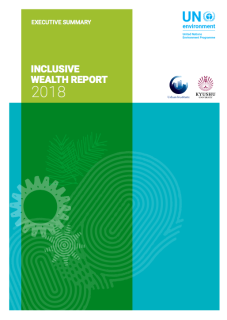
Inclusive Wealth Report 2018 argues that current measures of economic progress, like GDP, are a poor indicator of economic progress, environmental sustainability and human well-being. It presents the Inclusive Wealth Index (IWI), which looks at the manufactured, human and natural capital of 140 countries, and assesses the changing health of these assets over a quarter of a century – a massive dataset that covers almost an entire generation.
The IWI has enormous implications for economic policymaking. It can help countries scale up resource efficiency by providing policymakers with an overview of changes in the productive base of a country. It provides insights into whether current growth is sustainable or is based on an overexploitation of natural capital. This information can help leaders develop policies that promote sustaining growth while better managing human and natural capital.
The report builds on two previous editions, Inclusive Wealth Report 2014, which provides guidance and insight for policy-makers on how their economies are generating income, how depreciation and reinvestment are affecting capital stocks, and whether system trajectories are sustainable, and Inclusive wealth Report 2012, which looks at the productive base of economies, based on capital assets – produced or manufactured capital, human capital, and natural capital.
